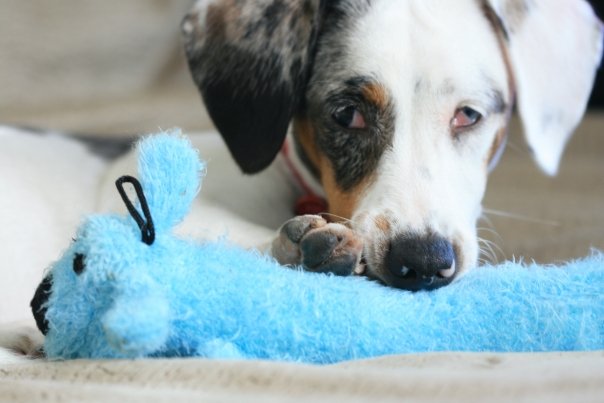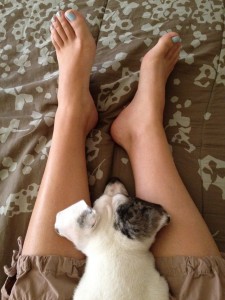A woman stopped me in my neighborhood as I was walking my dog. She pulled a bag of organic dog treats from her purse.
“Can doggie have a tweat?” she said in a high-pitched baby voice. She began to kneel by my dog.
“Um, sure,” I said. Then I launched into my prepared spiel: “Yes, my dog can have a treat. But don’t be offended if she doesn’t take it. She was born blind and deaf, so she gets a little nervous around people she doesn’t know.”
The woman stopped, stood up, put the treats back in her handbag.
“Well,” she said. “A dog like that should’ve been put to sleep. Put it out of its misery.”
I wanted to say, “You should’ve been put to sleep,” but I bit my tongue out of decency. Instead I said, “She’s a good dog,” and walked away.

That woman’s response was uncommon. Usually strangers act as though I’ve been feeding lepers in Calcutta. “That’s so good of you,” they say. “It’s very noble of you to take that on. She’s very lucky.”
But that’s not exactly what happened. I did not seek out a special-needs dog. This wasn’t an act of charity.
What happened was this: I was a newspaper reporter, covering a story at a local animal shelter. All of the small dogs at this shelter lived in the office, where I was conducting my interview. One of the dogs wiggled around my feet. She was long and weird-looking and moved too fast. I took a picture of the dog with my phone, and it turned out like a blurry thumbprint.
It was kind of like falling in love. There was a spark, a moment. When I couldn’t stop thinking about the dog two days later, I returned to the shelter.
That’s when a shelter worker told me the dog was deaf. “She’s broken,” he said.
I went home again and considered if I could raise a dog that couldn’t hear, couldn’t respond, would never know the sound of my voice. I discussed this with my then-boyfriend. Together we decided we could do it.
When I showed up to sign the adoption papers, I discovered the dog was blind too. Her left eye was misshapen and clear blue. Her right eye was clouded and brown. Both of them pointed in different directions, like a cartoon animal that’s been hit in the head with a frying pan. She was really broken. But by then I was too far gone to say no.
We brought the dog home and named her Lemon, like a bad used car. The cat hissed at her. She bumped into a lot of furniture. We suffered through long training days and many sleepless nights.
Now, four years later, Lemon has grown into exactly what I told the lady on the street — a good dog. She is an integral part of our family, and I don’t know if I ever want an unbroken animal companion again.

On behalf of Lemon, and all the other Lemons out there, here is why you should consider adopting a less-than-perfect shelter animal.
1. Broken animals have a different kind of intelligence. Lemon has keen instincts. She is a quick judge of character. And she plays the hell out of fetch, even though it’s more like hide and seek. I simply spray her toys with vanilla scent first, and Lemon can sniff out any tennis ball, rope twist or soft stuffed gorilla.
2. Broken animals are brave. My dog can find her way through a maze of furniture, hop on and off the bed and negotiate hiking trails — all with her eyes shut. Every day she teaches me something more about living fearlessly.
3. Broken animals are well-behaved. Lemon does not bark at the mailman. She does not notice when the doorbell rings. She is quiet in hotels. She doesn’t even glance at the dogs we pass on the street.
4. Broken animals are especially snuggly. Lemon loves fiercely and unconditionally. She doesn’t know me as the person who saved her; she only knows me as her family.
5. Broken animals improve your life. I am richer for having this dog as a companion.
Of course, adopting a broken dog also comes with some drawbacks:
1. Idiots approach you on the street and say your dog should be put to sleep.




